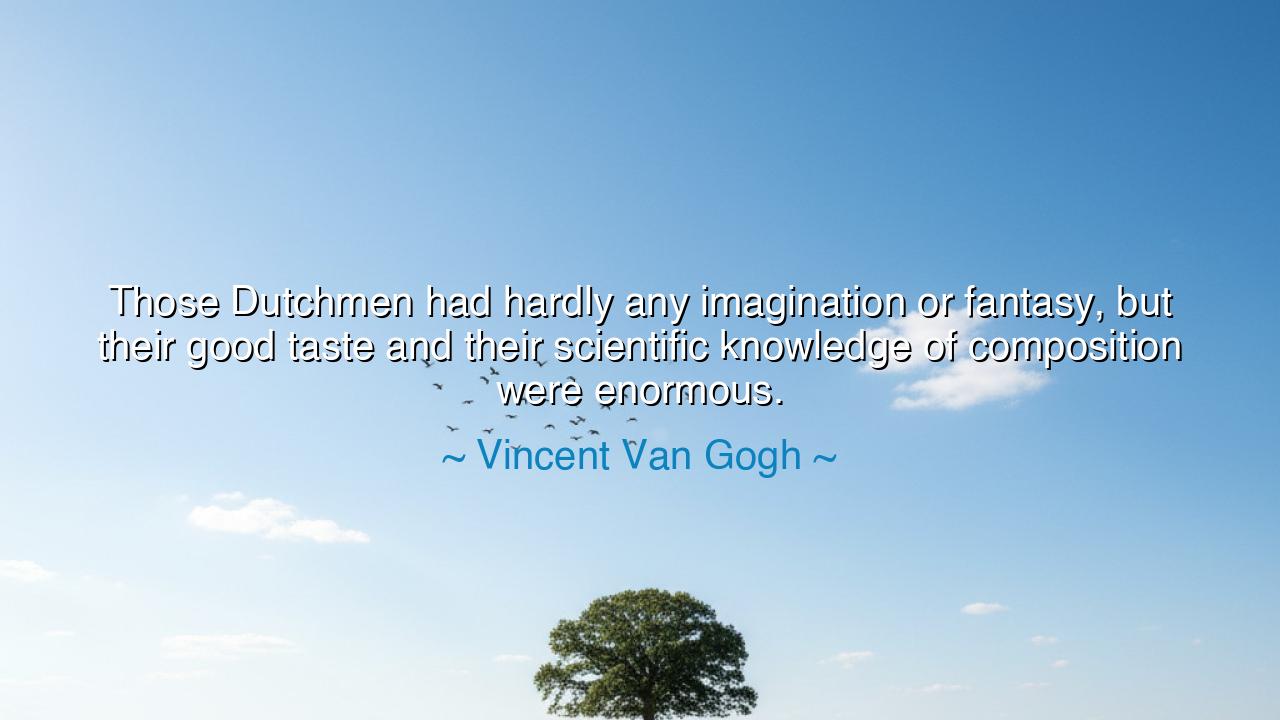
Those Dutchmen had hardly any imagination or fantasy, but their
Those Dutchmen had hardly any imagination or fantasy, but their good taste and their scientific knowledge of composition were enormous.






“Those Dutchmen had hardly any imagination or fantasy, but their good taste and their scientific knowledge of composition were enormous.” Thus wrote Vincent van Gogh, a man whose own imagination blazed like a sun over the gray plains of ordinary life. His words, humble yet piercing, reveal not a criticism but a deep reflection on the nature of art, craft, and the eternal balance between discipline and imagination. In this saying, Van Gogh honors his artistic ancestors — the Dutch masters of the Golden Age — while recognizing the limitation of their approach, one that prized technical mastery above emotional vision. He saw that great taste and scientific precision could create beauty, but without imagination, it could never breathe with the fire of the soul.
The origin of this quote lies in Van Gogh’s letters — sacred texts of an artist’s soul laid bare. In his correspondence with his brother Theo, Vincent often pondered the lineage of painters who came before him: Rembrandt, Vermeer, Frans Hals, and others. He revered their genius, their order, their knowledge of composition, but he longed to go beyond their restraint. The Dutch masters painted the world as they saw it — calm, structured, exact. But Van Gogh desired to paint the world as he felt it — wild, trembling, alive with spirit. He wished not only to depict form, but to translate emotion into color, imagination into shape. His words, then, reflect both admiration and rebellion — the son honoring his fathers, even as he breaks free to forge a new art.
In this contrast between good taste and imagination, we see the eternal tension that lives in all creation. The masters of technique bring order, harmony, and proportion; they craft the bones of beauty. But it is the dreamers, the visionaries, who give art its breath, its pulse, its madness. Without imagination, the painting remains a shell — perfect, perhaps, but without spirit. And without craft, the imagination remains chaos — passionate, but shapeless. Van Gogh understood that both are needed, but he also knew which one had been neglected in his homeland. He sought to restore the balance, to let fantasy rise again within the discipline of composition, so that art might live anew.
Consider the example of Johannes Vermeer, that quiet genius of Delft. His rooms are temples of light and stillness, each object placed with infinite care. There is scientific precision in his brushwork, and a kind of divine order in his space. Yet even Van Gogh, who revered Vermeer deeply, felt that something deeper still could awaken within such harmony — something that reached beyond calm into passion, beyond intellect into vision. It was that fire he would spend his own life pursuing. His Starry Night is, in truth, the rebellion of the spirit against too much calm — a storm of imagination breaking through the walls of structure. Where Vermeer whispered, Van Gogh cried out in color.
But let us not mistake Van Gogh’s words for arrogance. His praise of the Dutchmen’s knowledge and taste is sincere, for he knew his own art stood upon their foundation. Like a tree that grows tall because of the soil beneath it, Van Gogh drew from their discipline even as he stretched toward heaven. His own scientific knowledge of color theory, his obsession with proportion, and his meticulous study of light — these were the very roots that allowed his imagination to soar. He did not despise their rationality; he transformed it. Thus, the artist’s greatness lies not in rejecting the old, but in igniting it anew with imagination.
There is, too, a lesson here for every seeker of mastery: Skill is the body; imagination is the soul. To perfect one without the other is to live only half a life. The Dutchmen of Van Gogh’s time built the body of art — elegant, disciplined, alive with intelligence — but it was Van Gogh who gave it a soul again. His brush did not measure light; it felt it. His fields and skies do not obey geometry; they pulse with emotion. Through him, the imagination once again found its place beside science, not as an enemy, but as its companion and muse.
So let this teaching be remembered: knowledge refines, but imagination redeems. Study the laws of the world, but do not be bound by them. Learn from the masters, but dare to see what they could not. Let your work be rooted in skill, yet driven by wonder. For as Van Gogh shows us, the greatest art — and the greatest life — is born when the mind of order and the heart of vision finally embrace.
Thus, the words of Van Gogh stand not as judgment, but as prophecy. He foresaw the coming of modern art, where imagination would once again stride boldly beside knowledge. And though he walked the earth misunderstood, his vision endured — a testament that while good taste may please the eye, only imagination can set the soul on fire.






AAdministratorAdministrator
Welcome, honored guests. Please leave a comment, we will respond soon